Having recently heard of yet another homeowner being the victim of a costly con – which we’ll discuss later in this article – we felt it was time to provide a current roundup of prevalent scams that specifically target homeowners.
Given the wide breadth of responsibilities a homeowner faces, it is often necessary to hire and trust strangers (AKA home contractors) within tight time frames. These pressures, in turn, make homeowners ripe targets for unscrupulous contractors, as well as outright criminals.
Knowing that you’re a target is the first step to reducing the likelihood of being a victim of fraud in the future.
In this article, we explore the most prevalent scams that target homeowner, while providing useful tips and advice to keep you, your family and home all safe and secure.
Please help others stay informed and empowered as well by sharing this information.
Table of Contents
- Why We Wrote This Article
- 10 Most Common Homeowner Scams
- How to Protect Yourself Against Homeowner Scams
- Other Homeowner-Related Crimes
- FAQs
Also see:
- 10 Conflicts of Interest Every Homeowner Should Know
- How to Make Your Home Entrances & Deliveries Safe With Technology
- Informed Delivery: How to Preview Your Postal Mail Online for Free
- More Recommended Homeowner Consumer Protection Articles
- Related Topics: Consumer Rights | Protection & Safety | Contracts | Fake Reviews | Hiring Contractors
Why We Wrote This Article
Last week we learned that neighbors unfortunately fell victim to a con-artist who bilked them of over $13,000!
Surprisingly, the scam began in the safe confines of a nearby reputable store where the couple was shopping for flooring. Taking advantage of their susceptible position, the scam artist was able to gain their trust quickly by representing himself as a helpful flooring expert.

Not stopping there, he convinced the couple that not only was he was the right person to help with their project, but “fortunately” he was also available to start work immediately!
Keeping the momentum going, the scamster didn’t stop “soft pitching” until he successfully “persuaded” the couple into writing a check for over $13,000. To prolong the con, the contractor did actually “start the job”, when upon returning with the homeowners to their home, he proceeded to rip up their floors!
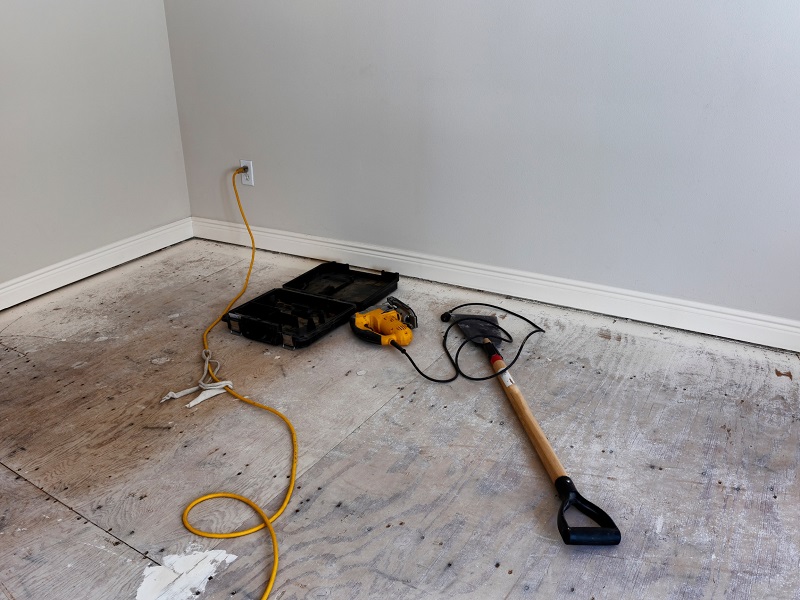
Unfortunately, however, he failed to return the following day, as promised … or the day after … until ultimately, the homeowners realized that he was never coming back. Giving slow drips of plausible hope that he would indeed return to the job, bought the “contractor” sufficient time for the check to clear, which prevented a “stop payment” request.
As it turns out, the phone that the scamster used was a burner cell. It was also learned that he had simultaneously conned another neighbor at the same time – two for the price of one! The incidents were able to be connected, as the first victim was considerate enough to share his disheartening learning experience with others on Nextdoor.
Disappointingly, many Nextdoor commenters on this story were unaware that in California there is a limit on down payment amounts for home improvement projects – 10% or $1,000 whichever is less. This knowledge alone would have limited the loss of the scam significantly.
Hence, we knew we needed to write this article.
10 Most Common Homeowner Scams
- Large Down Payments
- In-Store Shopping
- Door-to-Door Solicitations
- Homeowners Insurance Claims
- Post-Project Burglary
- Mortgage Loan Modification Scams (AKA Foreclosure Rescue Scams)
- Check Washing Scams
- Solar Panel Scams
- Home Title Theft & Fraud
- HOA Fraud
1. Large Down Payments
In many states, the payment amount that a contractor can request upfront is limited. Less reputable contractors will take advantage of customers, especially when they sense that clients are unaware of their consumer rights.
There are two likely scenarios that explain why contractors may ask for a large and illegal down payment amount:
- They are scam artists that plan to abandon the project as soon as the down payment clears
- They are not managing their finances well and they need payment upfront to cover other expenses unrelated to your project
To prevent being taking advantage of, be sure to check the laws surrounding down payments for your state. Nevada is another state where contractors can only request a down payment of 10% of the project, or $1,000, whichever amount is lower.
Reputable contractors will proactively share information of this type kind because they want to earn your trust and differentiate themselves from inferior competitors. They also want to manage your project by the book so that they cannot be unfairly accused of deceptive practices or not adhering to what was agreed to in the contract.
2. In-Store Shopping
Being approached by a contractor while shopping for materials such as flooring, paint or windows has become a common scam in larger cities, especially for new homeowners. With a laundry list of “to-do” items to get their new purchase in shape, first time homeowners are often uninitiated and vulnerable to the “Contractor in the Hardware Store” scam who just happens to be available and an expert in whatever project they are tackling.

The fact that you are meeting this person in a reputable place may give you a false sense of security:
“He acts like he’s a regular customer, and I suspect that store employees have probably known him for some time“
This feeling of reassurance is a key element of this particular type of con-fidence game. Unfortunately, the stores where these “confidence men” recruit their victims cannot be held liable for any part of your loss, unless they are deliberately providing a meeting place and are in on the grift.
In most cases, these con-tractors know where to find their next “mark” and utilize big box stores and large impersonal, and often intimidating, home improvement stores to do their recruiting.
Of course, it is possible to find truly wonderful and legitimate contractors in these places, but it bears repeating to vet any prospective contractors thoroughly and consistently.
3. Door-to-Door Solicitations
Similar to the “chance meeting” in a home improvement store, beware of any contractor knocking on your door “insisting he wants to do you a big favor”. He is never a friend of yours and should be viewed as a stranger with no references.
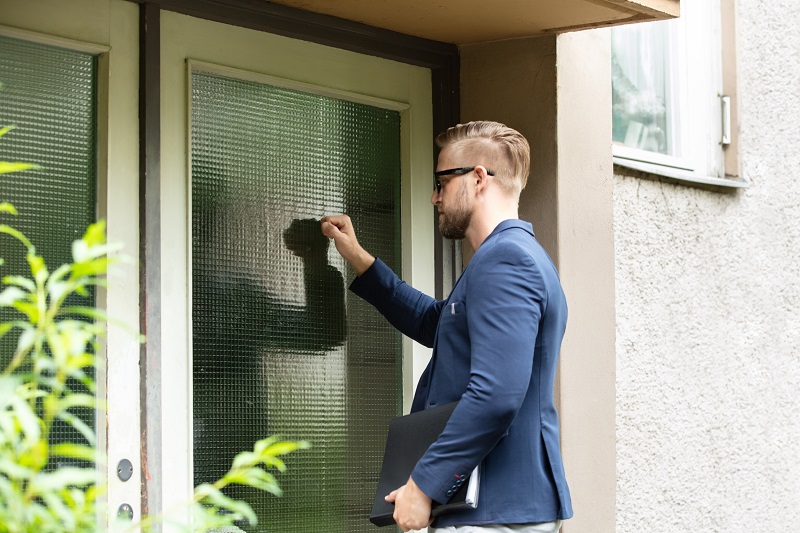
The scam involves the “contractor” having excess material of some kind, such as asphalt, paving stones, driveway pebbles, roofing tiles, or anything heavy and in large amounts, from a job that he is doing “just up the street“. Do not be misled into believing his “misfortune” can be used to your “advantage”.
Always Keep in Mind: There is never a job up the street!
The con artist’s ploy is to do you a favor by selling you the excess material while providing installation at a below cost rate. The resulting asphalt, for example, is usually some watered down, tacky substance that will make a mess of your current driveway. The paving stones or pebbles employed may be stolen, as well.
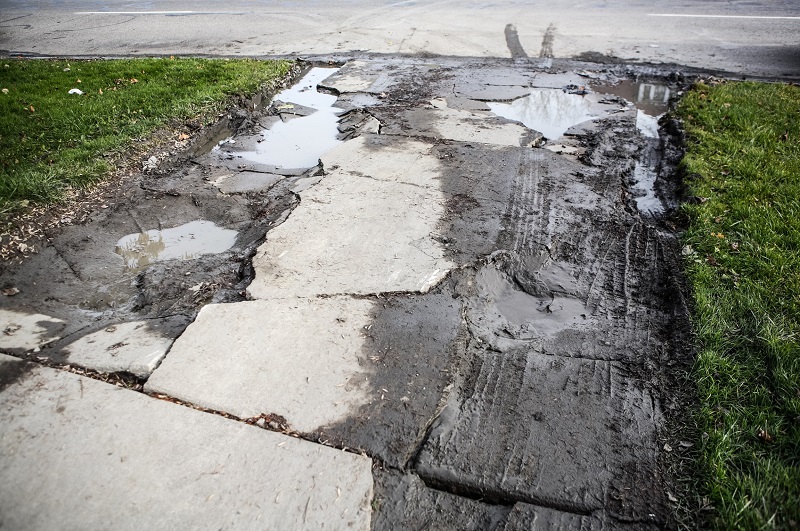
In any event, keep in mind how implausible it is for anyone to go door-to-door promising low-cost home improvement miracles delivered in under an hour! Just say “No”, or better yet, do not even answer the door!
4. Homeowners Insurance Claims
This type of scam typically involves dishonest contractors taking advantage of homeowners who have suffered property damage and, as a “courtesy” offer to handle the insurance claim process.
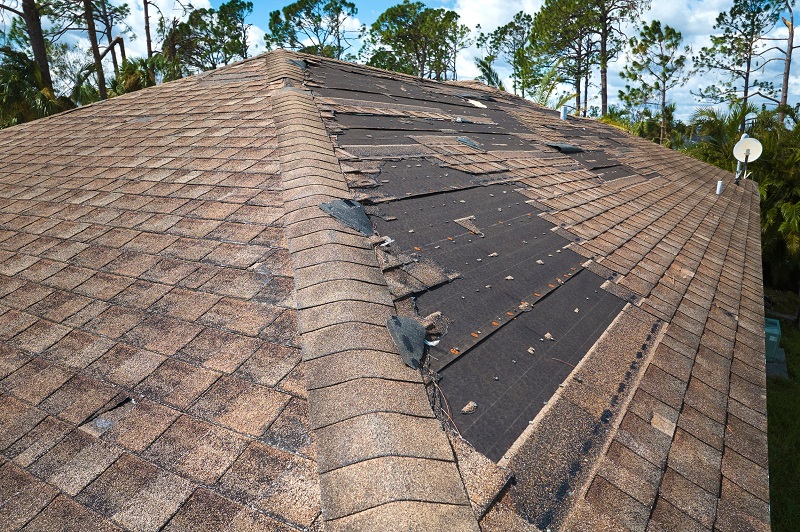
Scams of this nature can consist of: inflating repair costs; submitting false invoices; and performing subpar repairs. The results can leave homeowners with shoddy workmanship at best, or no completed work at worst. This form of cutting corners allows disreputable contractors to pocket more money dispersed by the insurance company.
The most egregious and prevalent scenario of this scam is when the contractor abandons the job by leaving town immediately after receiving authorized payment from the insurance company.
This type of scam is especially prevalent with roof repairs in the aftermath of major storms, as there is high demand for roofing services with scarce availability of reputable roofing firms, which attracts opportunistic criminals.
5. Post-Project Burglary
Another disconcerting “scam” we recently learned of was of a home that was burglarized soon after a home improvement project was completed. The fact that the crime took place while the homeowner was away on vacation likely made her home an attractive target during the project phase.
This scenario serves as a strong reminder to not share personal information with strangers, especially vulnerable persons that live alone. The risk may not be from telling something of a personal nature to a well-known contractor whom you trust, but when they innocently share information in passing with another stranger, e.g.:
“We need to get these materials in time to complete our project before our client leaves for an extended vacation”
During projects, you should always hide valuables, such as: house and car keys; computers; financial records; mail items; jewelry; mobile phones; and personal photos. Also be sure to close off any sections of your home outside the scope of your project.
The “scam” component of this type of crime relates to hiring or dealing with “professionals” with questionable backgrounds or a lackluster commitment to their trade. It is one thing to have a contractual disagreement with a reputable professional over pricing, craftsmanship or completion of work. It’s another thing entirely when suspecting that a “contractor” is just opportunistically trying to pass himself off as a home improvement professional in order to earn a quick buck.
Also see:
6. Mortgage Loan Modification Scams (AKA Foreclosure Rescue Scams)
Scammers often target homeowners who are struggling with their mortgage payments or seeking refinancing options. This class of con artists may promise loan modifications, foreclosure prevention, or debt consolidation services.
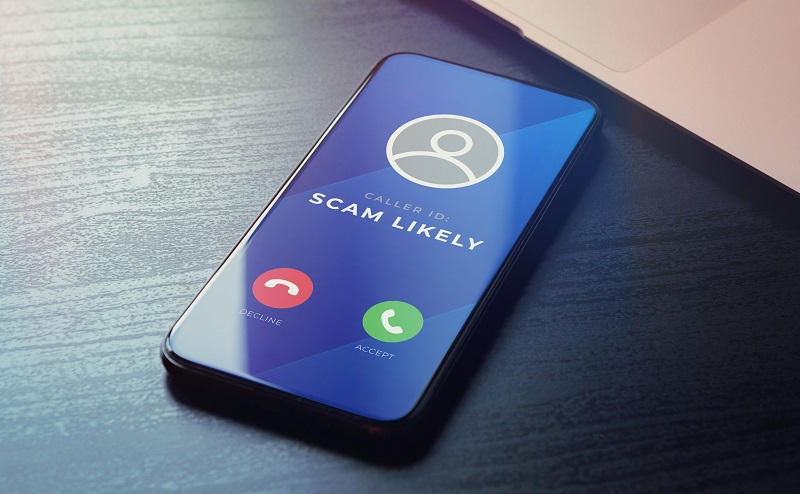
However, their real purpose is to charge excessive fees and collect personal information for fraudulent purposes, while failing to deliver the promised assistance. Always work with reputable lenders or seek guidance from legitimate housing counseling agencies.
Red flags to look out for include:
- Asking you to pay fees upfront in order to receive services
- Asking you to sign over the title to your property
- Asking you to sign papers that you do not understand
- Telling you to start making payments to someone other than your servicer or lender
- Telling you to stop making mortgage loan payments altogether
If anyone has made any of these requests of you, you can report that company by submitting a complaint with the CFPB online or by calling the CFPB at (855) 411-CFPB (2372).
Also see:
7. Check Washing Scams
Check washing involves the illegal alteration of a printed check that is typically stolen. An “intercepted” check can be altered by “chemically washing out” the payee or dollar amount fields in order to write in a new payee name or dollar amount.
Discovered on another Nextdoor post, a neighbor shared the misfortune of her property tax check being washed by a criminal (possibly a county employee) which led her to being delinquent on her tax payment. The homeowner was confused when she was alerted of this issue, as she knew her check had been cashed on time for the correct amount per her bank statement.
Unfortunately, when examining the digital image of the endorsed check it was revealed that the payee name had been changed from “County Tax Assessor’s Office” to an individual’s name. If you absolutely must write a check to make an important payment, be sure to know how best to prevent your check from being washed, such as using non-washable ink pens, also known as gel pens like the Uniball Signo 207.
This video from ABC7 NY explains two recent examples of check washing incidents.
Also see:
8. Solar Panel Scams
Solar panel scams have become prevalent again because the demand for solar panels has been rising for the following four reasons:
- Electricity costs have been rising
- Solar costs have been declining
- Solar power technology has been improving
- Federal, state and local financial incentives abound
Scams can range from the most egregious (e.g. fake solar companies that never do any work after receiving down payments) to prevalent customer dissatisfaction over expectations not being met.
The most common type of solar panel scam has do with entering confusing and unfavorable financing agreements or expecting better cost-benefit performance that never materializes. Given that there are many options to consider both in terms of features and financing options, rushing into a solar panel agreement is never a wise choice.
Red flags to look out for include:
- Fake solar companies that never do any work except take large down payments
- Fake solar companies that are fronts for identity theft scams
- Misleading or confusing Solar Lease contracts or Power Purchase Agreements (PPAs)
- Contracts that are difficult to exit or break
- High-pressure sales tactics, including Door-to-Door Salespeople
- Exaggerated cost-savings and performance promises
- Claims of “free” solar panels
- Solar companies that absolve themselves of any responsibility, such as fixing installations or making future repairs
Legitimate solar panel companies will not only provide you ample time to go over options thoroughly, they will even tell you upfront if solar panels are not a good option for the combination of your location (e.g. “sunniness”) and your historic energy consumption.
Also see:
9. Home Title Theft & Fraud
The key to understanding scams involving home titles is first recognizing that there are two types of home title crimes:
- Home Title Theft
- Home Title Fraud
Home Title Theft involves a scamster deceptively persuading a homeowner to sign a legal document, which transfers ownership of the property to a third party. Typically the homeowner is under the false impression that this type of “transaction document” is in lieu of a home equity loan.
Once a duplicitous third-party becomes a legal owner of your property, all kinds of havoc can be unleashed which all lead to the high likelihood that the original and rightful homeowner will lose their home. However, due to many safety checks and balances in place, this type of crime is rare compared to Home Title Fraud.
Home Title Fraud, on the other hand, is a more prevalent scam as it involves using fake home titles to dupe persons other than legitimate homeowners. Adding to the confusion around home title crimes are misleading “home title monitoring” commercials that attempt to scare homeowners that someone can easily “steal your title” without your knowledge.
One key fact these advertisements fail to mention is that if a transference of title occurs without your permission or involvement, the home will still be legally yours, as fraudulent paperwork voids the sale.
A common Home Title Fraud scam involves tricking an unsuspecting homebuyer into “buying” a home from a scamster who does not have legal ownership of a given property. An adept con-artist typically uses fake documents, an actor portraying the seller, and a vacant or “abandoned” home (e.g. a home with an absentee landlord) to present a powerfully persuasive illusion that a home is available for sale.
Also see:
10. HOA Fraud
To get a sober understanding of the damages that fraud committed by Homeowners Associations (HOAs) can inflict, be sure to read up on the recent criminal case of the Hammocks Community Association, Florida’s largest HOA with over 5,800 homeowners. Criminal allegations and charges include: 300% fee hikes; the arrests of four board members plus the husband of one board member; $2M in stolen funds; election tampering; unreasonable code violation fines; illegal threats of foreclosure; an annual budget ballooning from $4M to $13M; and more!
Video: Hammocks HOA board members behind bars for allegedly stealing millions from association
Fraud committed by HOAs are often due to one or more of the following circumstances:
- Most HOA Board Members are unpaid volunteers
- There is often minimal oversight of board activities
- Individual board members often have unmonitored access to HOA funds
- Board members may have personal relationships with businesses hired by the HOA
- HOA Board Members are tempted by financial gain and the belief they won’t get caught
Types of HOA fraud include:
- Misappropriation of funds (embezzlement)
- Kickback payments from legitimate contractors and service firms
- Payments for phony contractors or unnecessary services
- Forged approvals
- Falsified book keeping
- Election rigging or tampering
- Non-disclosure or inaccurate disclosure of finances, operations or contractual obligations
- Gross incompetence
Red flags to look for that an HOA may be involved with fraudulent behavior include:
- Sudden increase in dues or fees
- Lack of transparency in financial records
- Conflict of Interest relationships with contractors or vendors
- Unvetted and unverified contractors and vendors
- Shoddy maintenance or repair work
- Lack of responsiveness or hostility toward reasonable homeowner inquiries
- Checks written to board members instead of to the HOA
- A lack of oversight in HOA board operations
- A surge in vendor pricing
Here are several policies to follow that can significantly reduce the chances of HOA-related fraud:
- Get involve with all HOA activities and encourage your neighbors involvement, as well
- Define prohibited conflicts of interest with vendors and require disclosure obligations
- Hire an outside CPA to audit your HOAs finances on a recurring basis
- Require two signatures for all checks
- Require all checks be made out to the HOA
- Require board approval of all new vendors
- Require a majority homeowner approval for all contracts over a certain dollar amount or term length
- Require an outside attorney to review of all contracts over a certain dollar amount and term
Lastly, we strongly recommend reading and researching the many informative articles on the Independent American Communities (IAC) website. Deborah Goonan has been writing on behalf of homeowners living in HOA communities for many years. Here are a few articles with which to start:
- HOA Risks: The Triple Threat of Homeowners Associations>
- Where can homeowners turn for help with HOA problems?
- What can be done about HOA problems and dysfunction?
How to Protect Yourself Against Homeowner Scams
- Look Out for Common Red Flags
- Follow These 4 Tips When Hiring a Contractor
- Stay Abreast of Local Crime News & Share Your Own Tips
Look Out for Common Red Flags
Most, if not all, of the prevalent scams we covered are examples of Theft by Deception and involve several common elements, specifically:
- Unvetted strangers
- Unsolicited offers
- Personal information & data that can be used for identify theft
- Large down payments
- Unfamiliarity with local laws & regulations
- Non-written agreements
- Poorly written contracts
- Irrational sense of urgency
- Exaggerated capabilities or deliverables
- Confusion over the process or documentation
- Cutting corners on the vetting process
Though it is not feasible to be an expert on a wide-range of scams, it is possible to leverage a hard-and-fast rule of backing away from any contract or agreement that is laden with red flags. Retreating from an “offer” is especially important prior to submitting value personal information, as the underlying goal of many scams may be identity theft.
In other words, rationally trust your instincts when something does not feel right. Write down the reasons why something may feel “off” to you, as seeing written words will help you better discern the underlying risks. Conversely, if something seems too good to be true, you’re probably right that it is.
However, even if you do sign an agreement, most states have right-to-cancel consumer protection statutes that allow homeowners to cancel a contract for any reason, typically within three business days.
Another good rule of thumb that can provide you protection is to ask for more time to review documents and make a decision before making any payment, big or small. How a prospective contractor responds to this understandable request can often be an accurate signal of their character.
Another important rule of thumb is involving a partner (e.g. spouse or friend) when vetting a given contractor and contract proposal. A second person can help detect additional red flags with both the contractor and the proposal. By the way, having a friend come by during home improvement projects when working with a contractor for the first time is also a good safety practice to follow for homeowners that live alone.
Keep in mind that con artists need their victims to make rush judgments to the point of feeling self-conscious of not being able to make a decisive decision on “such an obviously attractive opportunity”. Do not succumb to this bullying tactic.
Also see:
Follow These 4 Tips When Hiring a Contractor
When you hire a contractor for the first time you are inviting a stranger into your home. Therefore, never treat this process lightly as this “relationship” involves financial risk, as well as personal risk to your family and home.
- Tip #1: Always Check for a License
- Tip #2: Get Multiple Bids in Writing, with Details
- Tip #3: Get References from Similar Previous Jobs
- Tip #4: Don’t be Rushed!
Tip #1: Always Check for a License
In many states, there is a dollar threshold, usually $500, that limits the amount of work an unlicensed or “handyman” can perform. Always choose a license, insured and bonded contractor no matter how low his bid may be, this is your insurance against anything going sideways. Your home, your very expensive investment, is at stake and ignoring Rule #1 can cost you dearly and in many cases may invalidate your home insurance coverage.
Tip #2: Get Multiple Bids in Writing, with Details
Formalize your contract to include your expectations about timing, grade, type or brand of materials, scope of the project – what is and what isn’t included and expectations on progress payments.
Know your state and city laws on this, such as contractor down payment limits and right-to-cancel periods.
Make sure to include specifics about what constitutes a phase completion, such as:
“Demolition: All current master bedroom walls are to be taken down to the studs, the area Shop-Vac cleaned and debris hauled to a legal construction waste disposal site.”
Tip #3: Get References from Similar Previous Jobs
Get the names of homeowners from three jobs, similar to yours that you can call or visit to inspect the contractor’s work. Spend the necessary time to research a prospective contractor as this is where many homeowners get into trouble. Rushed homeowners often jump into a relationship with an unknown entity while assuming that will receive a certain level of quality and professionalism. When a conflict or disagreement arises, and it will, they will wish they had followed Rule #3.
Tip #4: Don’t be Rushed!
Scammers take advantage of emergency situations when homeowners are often most vulnerable. Take your time, as there will be many decisions to be made and rushing into a contract or being told that he is only available this week, is a sure sign that you are being hustled.
Also keep in mind to search for interim solutions for your situation (e.g. tarps on leaking roofs) to buy you time before choosing a long-term remedy to your problem.
Stay Abreast of Local Crime News & Share Your Own Tips
Nextdoor is a terrific source of staying abreast of local scams that target homeowners. Sharing local news stories of scams on local community sites, like Nextdoor, is also a constructive way to make neighbors aware of new scams. Asking follow-up questions for clarification will further fuel awareness and understanding of prevailing signs of fraud.
Plus, giving thankful support to neighbors that do share helpful information will encourage on-going engagement to the betterment of all residents. Conversely, it is helpful to provide clarification of unusual, but legitimate events, so that neighbors understand what is going on in their neighborhood.
Staying abreast of your local news consumer investigative team, as well as announcements from your local police department will also help you stay current on new or increasing types of scams. These types of public service reports are often strong reminders that you have to be extra vigilant when being in public. Scam artists often work in teams to distract their targeted victims.
YouTube can also be a helpful way to discover and learn about new types of scams, as there are various channels that have taken on personal missions to thwart scammers.
Other Homeowner-Related Crimes
Remote Garage Door Scanning
Though technically not a “scam”, increasing numbers of criminals are canvasing residential neighborhoods using devices to exploit the wireless signals of electric garage door openers.
A neighbor recently shared their experience on Nextdoor when they experienced their electric garage door opening repeated times late one night. Fortunately, the noise awakened the homeowner who was then able to shut the door after each failed attempt.
A Helfpul Video from How to Home: How to Stop Garage Door Break-Ins
Residential Package Theft
“Porch Pirates” stealing packages delivered to one’s front door has become a well-documented and recorded crime having grown in parallel with the rise of Amazon and online shopping. Since security video cameras may not deter the most brazen of thieves, more homeowners are investing in newer parcel and mail security solutions.
Also see:
Gift Card Scams
Though gift card crime and fraud do not single out homeownership specifically, fraud related to gift cards are certainly of relevance to homeowners and their friends and families.
First, there are two types of emerging gift card fraud or crime:
- Con artists that trick victims to purchase gift cards to make a payment of some kind
- Tampered gift cards purchased in legitimate retail establishments
“Gift card payment fraud” is another stark reminder that people are susceptible to believing all kinds of illogical cons. In regards to gift cards, once scammers have your gift card number and PIN, they have your money. Gift card scammers will often claim to work for the government, utility companies or tech support firms.
Here is one example related to homeownership:
A California homeowner was going through financial difficulties, including being in arrears with his local utility company. Owing money to the local power company made him a prime target of con artists. A persuasively stressful and “urgent” phone call convinced the homeowner that he needed to pay off his outstanding utility debt with gift cards. Not only did the victim follow the scammer’s instructions, he ended up paying significantly more than what he actually owed the real utility company.
Keep in mind:
Gift cards are for gifts, not for payments. – FTC
A second, more deceptive type of gift card crime involves purchasing tampered physical gift cards at legitimate retail stores. Thieves of this kind (likely retail insiders) remove the protective stickers on the card in order to record the card number and corresponding PIN number. They then re-cover the originally protected areas of the card.
With this information in hand, the criminals use computer technology to check continually if a card has been activated. As soon as they receive a notification that a card has been activated, they immediately use the underlying funds.
Before purchasing a physical gift card, be sure to inspect it closely to ensure that the stickers do not look altered or suspicious, especially the PIN number on the back. This type of crime is rarely reported as it can be an embarrassing matter for recipients to inform corresponding gift-givers that they sent a card without any loaded money.
Though we do not know if this has happened to date, it would be possible for a backend database to be hacked to acquire corresponding card numbers and PINs directly, without having to alter physical cards. In any case, we recommend activating gift cards only when you plan to use the card to reduce the chances of the underlying funds being stolen.
Also see:
FAQs
Does homeowners insurance cover scams?
Homeowners insurance generally does extend coverage to financial losses resulting from scams or fraudulent activities. Scams are considered intentional acts of deception, and insurance policies typically exclude coverage for losses arising from fraudulent schemes. Specialized insurance products may be available that specifically address fraud or identity theft, but these would be separate policies from standard homeowners insurance.
Does homeowners insurance cover contractor theft?
Homeowners insurance typically covers theft of personal belongings and property within the insured’s home or property. However, when it comes to contractor theft, coverage may vary depending on the specifics of the insurance policy and the circumstances of the theft.
Generally, if the thief was hired by the homeowner, this loss would be covered by homeowners insurance. However, if the thief were an employee or subcontractor of the hired general contractor, the GC’s liability insurance would likely need to cover this loss.
If you are concerned about potential theft during a home renovation or construction project, you may want to inquire about additional insurance or bonding options to protect yourself from such situations.
Recommended Homeowner Consumer Protection Articles
- Shortcomings of Home Warranty Plans
- Why You Should Never Loan Your Ladder to a Contractor
- What You Should Know When an Agent Represents Both Buyer & Seller
- 5 Things to Look for in the Fine Print of a Home Warranty Plan
- Important Must-Have Legal Documents for Homeowners
- Signs of a Bad Contractor Before You Sign a Contract
- Best Online Legal Services for Homeowners & Property Owners
- How to Live in a World of Fake Reviews
- Homeowner Liability With DIY Projects
- Related Topics: Consumer Rights | Protection & Safety | Contracts | Fake Reviews | Hiring Contractors
| Purgula is reader-supported. When you click on links to other sites from our website, we may earn affiliate commissions, at no cost to you. If you find our content to be helpful, this is an easy way for you to support our mission. Thanks! Learn more. |







